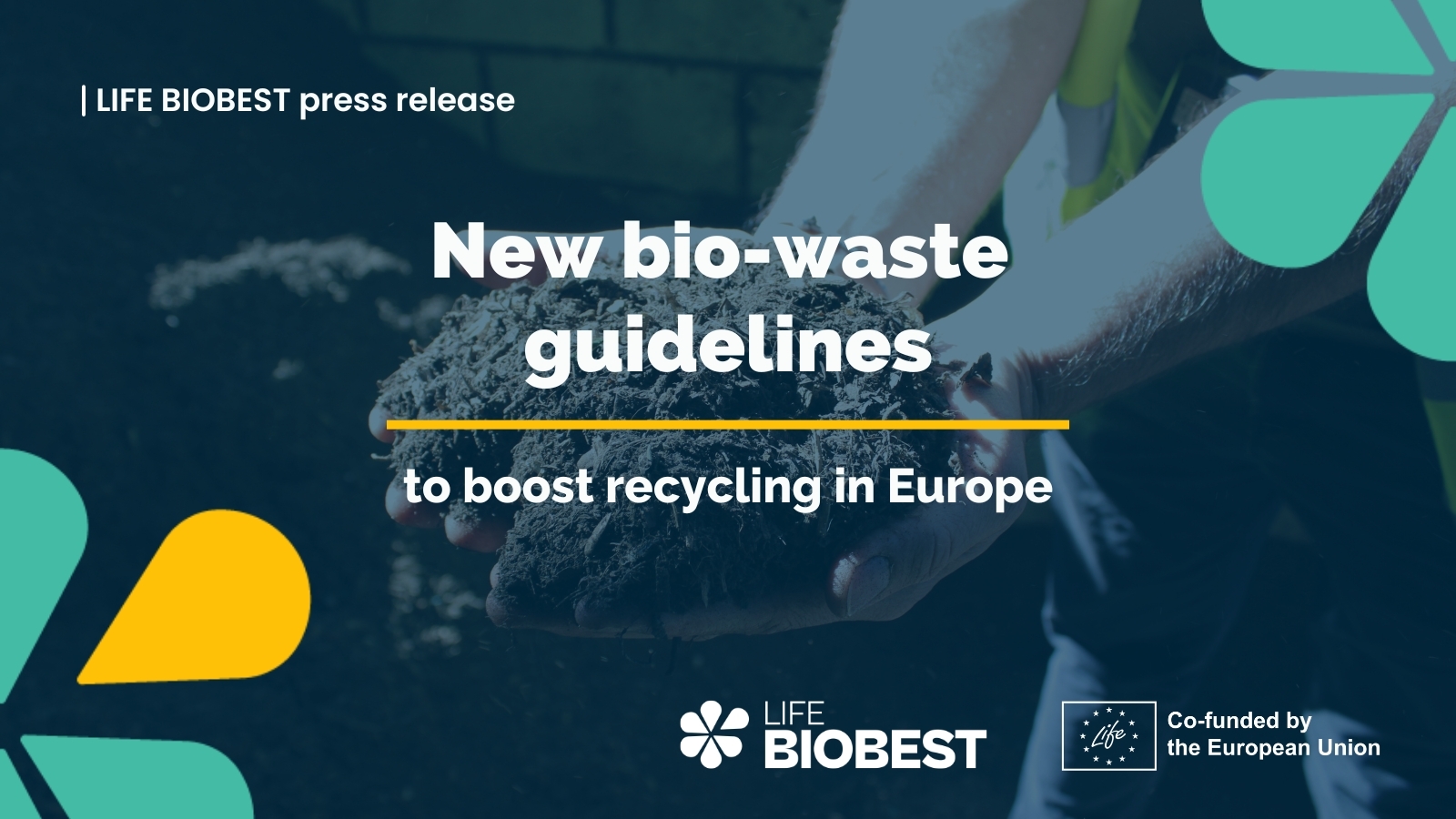New bio-waste guidelines set to boost recycling in Europe

Local authorities benefit from efficient bio-waste management to achieve EU recycling targets
Brussels, 27 June 204 – The LIFE BIOBEST consortium has released a four-part series of guidelines aimed at fostering bio-waste recycling to high-quality compost and digestate across the EU. Adopting these guidelines would transform waste into resources, promote soil health and reduce our landfill and incineration usage.
The guidelines on best practices for sustainable and efficient bio-waste management were developed in collaboration with leading environmental organisations and represents a significant advancement in bio-waste management practices across Europe. They will equip local authorities with proven strategies to improve bio-waste management such as: implementing strong regional regulations aiming at high-quality compost; separating kitchen and garden waste; communicating the economic viability of implementing best practices in bio-waste management; and integrating bio-waste recycling into current systems.
Manon Jourdan, Implementation Officer at Zero Waste Europe, states:
“The adoption of these guidelines will enable communities across Europe to close the loop on organic waste, turning what is still seen by some as a problem into a resource for our soils health and an opportunity for local economies.”
Gemma Nohales, project coordinator of LIFE BIOBEST from ENT Foundation, states:
“The key is to integrate the best practices and realign incentives through the effective use of governance and economic instruments so that bio-waste management is technically efficient and financially viable.”
The guidelines cover a range of topics like best methods for the separate collection of bio-waste , the governance tools and economic instruments needed to improve them, recommended treatment technologies for compost and digestate production, as well as regulatory frameworks to assure a high-quality of products, alongside best practices in communication and education using nudging techniques from behavioural science to help authorities encourage citizens to recycle bio-waste.
Steffen Walk, Scientific Officer at the European Compost Network, advocates:
“Advances in bio-waste management, particularly treatment, are critical to improving circularity by returning stabilised organic matter to the soil to improve its structure, health and fertility, thereby increasing benefits to agriculture.”
The guidelines address the diverse needs of communities, both urban and rural, as well as tourist hotspots where waste is far higher, offering tailored solutions to ensure each municipality can implement the most effective bio-waste management practices.
Jean-Benoît Bel, senior project manager at ACR+, adds:
“By integrating best practices and innovative solutions, we are empowering municipalities and organisations to implement effective bio-waste management systems.”
The LIFE BIOBEST consortium calls on Member States, regions, municipalities, waste management companies, and policymakers to integrate these guidelines into their waste management strategies. Doing so will enhance the quality and efficiency of bio-waste recycling.
ENDS
Notes to the editor
Links to the guidelines:
“Guideline on the separate collection of bio-waste”: https://zerowasteeurope.eu/library/guideline-on-the-separate-collection-of-bio-waste/
“Guideline to promote quality compost and digestate”: https://zerowasteeurope.eu/library/guideline-to-promote-quality-compost-and-digestate/
“Guideline on governance and economic incentives”: https://zerowasteeurope.eu/library/guideline-on-governance-and-economic-incentives
“Country Factsheets on the analysis of communication and engagement practices”: https://zerowasteeurope.eu/library/country-factsheets-on-the-analysis-of-communication-and-engagement-practices
The LIFE BIOBEST project, funded by the European Union, brought together experts from the Consorzio Italiano Compostatori (CIC), Fundació ENT, European Compost Network (ECN), and Zero Waste Europe (ZWE). This project runs for 30 months, now in its 18th month. These guidelines have been created six months after the mandatory separate collection of bio-waste had come into force to offer strategic and practical approaches to effective bio-waste management.
For more information and to download the guidelines, visit the LIFE BIOBEST project website at www.lifebiobest.eu.
ABOUT THE PARTNERS
ACR+ is the Association of Cities and Regions for sustainable Resource management. We are an international network of cities and regions sharing the aim of promoting a sustainable resource management and accelerating the transition towards a circular economy on their territories and beyond. www.acrplus.org
The Italian Compost and Biogas Consortium (CIC) is a non-profit association gathering 144 members including composting and anaerobic digestion facilities. Considering its background and the good performance of Italy regarding bio-waste capture rate and quality compost, CIC is involved in activities EU-wide showcasing how the bio-waste value chain can return organic carbon to the soil while generating energy carriers and green jobs. www.compost.it
The European Compost Network (ECN) is a membership organisation with 66 members from 27 European Countries, promoting sustainable recycling practices in composting, anaerobic digestion and other biological treatment processes of organic resources. www.compostnetwork.info
ENT Foundation (ENT) is a research centre based in Barcelona and dedicated to the elaboration, analysis, and implementation of public environmental policies. ENT’s team is comprised of around 25 highly specialised consultants. www.ent.cat
Zero Waste Europe (ZWE) is the European network of communities, local leaders, experts, and change agents working towards a better use of resources and the elimination of waste in our society. We advocate for sustainable systems; for the redesign of our relationship with resources; and for a global shift towards environmental justice, accelerating a just transition towards zero waste for the benefit of people and the planet. www.zerowasteeurope.eu